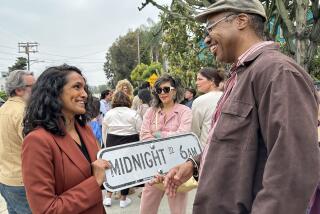ORANGE COUNTY VOICES ELECTIONS : Measure N Was Seen as Someone Else’s Fight
- Share via
I knew that our campaign against Measure N and our effort to provide gays and lesbians protection from discrimination by keeping Irvine’s Human Rights Ordinance intact was in trouble several days before last Tuesday’s election.
It had nothing to do with the polls, the input from “political experts” or gut feelings. It came from a growing reality that many of the people in our community did not see this issue as their issue.
Each day, as my personal visibility grew as a spokesman for those trying to retain the protections of the broad-based ordinance, I had more and more people come up to me and say: “Good luck, Fred. I hope you guys win.”
It suddenly occurred to me that “you guys” did not mean “we guys.” And, for whatever reason, these people did not see themselves involved in the struggle to provide protection from discrimination in housing and jobs to a segment of our society that does not have that now.
Most of us who worked on this campaign, however, knew early on that this was much more than just a homosexual issue. It is an issue that will affect each of us someday. It is an issue of how and by whom our moral and social choices will be decided in the future.
The Rev. Lou Sheldon’s news conference Wednesday was confirmation of our worst fears. He has made it clear that his “agenda” is going to take him into our schools, homes and political processes.
Through his coalition, along with his subsidiary groups, Sheldon has indicated that he plans to lobby and legislate his legalistic and rather narrow form of morality on the rest of the country.
Using the homosexual issue as a launching pad, Sheldon has indicated that he will fight for Christian and “family values” in our country, defining both by his own particular standards.
Sheldon is just one of several crusaders in our country today who are working through the political systems to impose their particular brand of morality, ethics and religion on the rest of us. These folks would like to tell us what we can teach in our public schools: whether or not we will have sex education and assertiveness classes; what books our teachers can use and what subjects they can teach. They would also like to dictate what movies we can watch, what books we can read and what we can see on TV. They would remove women’s choices over what they can do with their own bodies. They would like to tell us which minorities deserve protection and which ones do not, based on their own beliefs and set of rules.
No. This is not just a homosexual issue. It never has been and it never will be. It is about the eroding rights of some and providing the protections of the rights of others that were never there in the first place. It is an issue of tolerance and intolerance. It is an issue that affects everyone of us now and into the future.
I sometimes wonder if we are not like the frog that does not leap out of the water that is heated very slowly until we are cooked because we did not notice any major change--because we did not think it was our problem.
I am well aware that this seems to be a confusing and chaotic world right now. The economic uncertainties, the drug and crime problems, the divorce rate and the homeless all add to the confusion and frustration. How nice it would be if we could just turn back the clock to a Shangri-La of the past. How wonderful it would be if we had a written book that would give us instructions on how to deal with every situation in our world and in our lives--a book that would spell out each tough decision we must make, each moral choice we confront.
But imposing a moral and social code based on some written word preserved over centuries has the danger of becoming dogmatic, legalistic and divisive. And it often ends up doing just the opposite of what the writer originally intended.
As a Christian pastor, I am aware that Jesus had to deal with this same legalistic mentality in his time. He was in a constant battle with the scribes and the Pharisees of the temple over the role of scripture and codes of his day. It is clear, however, that for Jesus, if observing the code caused pain or kept suffering from being eliminated in another human being, the law was set aside.
Thus Jesus healed on the Sabbath, he ate foods forbidden by law, he touched the “unclean” and hung around with the lowly, the ostracized, the forbidden “minorities” of his time. He made the hated Samaritans of his time the heroes of his parables and apparently never suggested that they must change their religious beliefs or their law. For Jesus, these were matters of the heart, not the books.
Jesus was dealing with the larger issue--he was dealing with unconditional love and acceptance of others as if they are ourselves. He was dealing with a way of relating to our Creator and to our world--a way of relating to our fellow human beings. That was the real issue that faced voters in Irvine last Tuesday. And it is the real issue today.
So, no matter how time consuming or frustrating it may be, we must conscientiously decide who will make those decisions--or they will be made for us.
More to Read
Sign up for Essential California
The most important California stories and recommendations in your inbox every morning.
You may occasionally receive promotional content from the Los Angeles Times.













